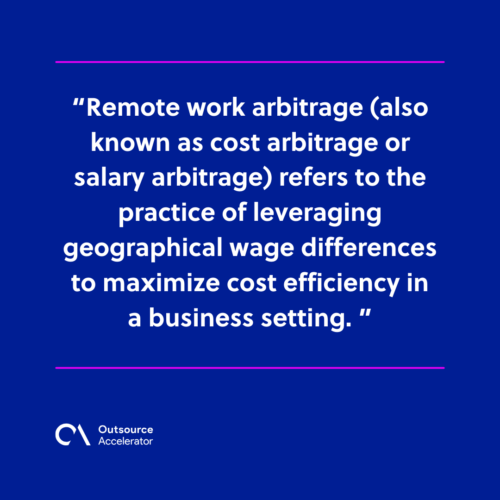Remote work arbitrage: Boon or bane for employers and employees?

Remote work has indeed revolutionized the way we think about employment, untethering many from the confines of traditional office settings.
One intriguing concept that has emerged from this shift is salary arbitrage in remote work.
Remote work arbitrage leverages geographical wage differences. It allows companies to tap into global talent pools while capitalizing on lower wage expectations in different regions.
This practice not only offers significant cost savings for employers but also opens up new opportunities for employees in lower-wage areas.
In this article, we will explain remote work arbitrage, explore its impact on employers and employees, and discuss some strategies for successful implementation.
What is remote work arbitrage?
Remote work arbitrage (also known as cost arbitrage or salary arbitrage) refers to the practice of leveraging geographical wage differences to maximize cost efficiency in a business setting.
By employing remote workers from regions where the cost of living—and consequently, salary expectations—are lower, companies can significantly reduce their labor expenses while maintaining or even improving the quality of work.
These regions with lower cost of living include top offshore staffing destinations, like The Philippines, India, and Vietnam.

Basic principles of arbitrage
Arbitrage, a concept borrowed from finance, involves taking advantage of price differences between markets to make a profit.
When applied to labor markets, the principles of arbitrage can be outlined as follows:
- Exploiting wage disparities. Identifying and utilizing the differences in wage expectations between various regions.
- Cost efficiency. Reducing overall operational costs by hiring talent from lower-wage areas without compromising on quality.
- Resource optimization. Accessing a global talent pool to find the best skills at the most competitive rates.
- Risk management. Diversifying the workforce across multiple regions to mitigate risks associated with local economic fluctuations.
Remote work arbitrage: Geographical wage disparities
Geographical wage disparities are influenced by several factors, including:
- Cost of living
- Economic development
- Local labor market conditions
For instance, a typical salary for a software engineer based in Los Angeles is US$9,000, while the average salary for the same role in India is US$900.
These are the typical salaries for both countries in the same role, even if the staff’s skills and experience levels are similar. By leveraging these differences, companies can achieve substantial cost savings.
However, it’s essential to recognize the complexities involved in managing a geographically dispersed workforce. Differences in time zones, cultural norms, and communication styles can pose challenges that need careful navigation.
Understanding the dynamics of remote work arbitrage is vital for businesses looking to stay competitive in today’s globalized economy.
Benefits of remote work arbitrage
Remote work arbitrage offers a range of advantages to both employers and employees.
Benefits of remote work arbitrage to employers
Let’s explore the specific benefits for companies:
Cost savings
Global Workplace Analytics revealed that many businesses lose over $600 billion per year to workplace costs.
Hiring employees from regions with lower wage expectations can significantly reduce payroll expenses, office space, utilities, and other operational expenses.

Access to global talent
Businesses can tap into a worldwide talent pool, finding specialized skills and expertise that might be scarce or expensive locally.
Thus, a diverse workforce brings varied perspectives and ideas, fostering innovation and creative problem-solving.
Scalability and flexibility
Remote work allows for easy scaling up or down based on project needs without the constraints of physical office space. With employees across different time zones, businesses can also operate and provide support 24/7.
Benefits of remote work arbitrage to employees
Remote workers are able to take full advantage of:
Increased employment opportunities
Workers from lower-wage regions can access job opportunities in higher-paying markets, increasing their earning potential. Exposure to international projects and clients enhances skill development and career growth.
Work-life balance
Remote work often comes with flexible schedules. This allows employees to balance work and personal commitments better.
Virtual workers save time and reduce stress by eliminating daily commutes, leading to improved overall well-being.
Improved job satisfaction
Remote work offers greater autonomy, which enables employees to manage their work environments and schedules.
The ability to work from anywhere allows remote staff to choose to live in locations that offer a better quality of life at a lower cost.
Remote work arbitrage: 5 strategies for successful implementation
Effectively implementing remote work arbitrage requires thoughtful planning and execution. Both employers and employees must navigate various challenges to maximize the benefits of this model.
Here are five key strategies that can help ensure a smooth and effective transition to labor arbitrage:
1. Develop a robust remote work policy
A comprehensive remote work policy is essential for setting clear expectations and guidelines. This policy should cover aspects such as:
- Communication protocols
- Work hours
- Productivity metrics
- Cybersecurity measures
By establishing clear rules and standards, employers can ensure consistency and accountability across a geographically dispersed team.
Moreover, a well-defined policy helps employees understand their responsibilities and the support available to them, fostering a sense of structure and stability.
2. Invest in training and development
Training is crucial for both managers and employees to adapt to the remote work environment. Managers need to develop skills in remote team management, including:
- Effective communication
- Performance monitoring
- Conflict resolution
Employees, on the other hand, should be trained to use digital tools and maintain productivity while working remotely.
Continuous learning opportunities can also be provided to keep the workforce up-to-date with industry trends and technological advancements. Investing in training and development ensures that the entire team is well-equipped to thrive in a remote setting.
3. Utilize advanced collaboration tools
The right tools can significantly improve the efficiency and effectiveness of remote work.
Investing in collaboration platforms (e.g., Slack and Zoom) and project management software (e.g., Asana or Trello) can facilitate seamless interaction and coordination among team members.
These tools help bridge the gap created by physical distance, enabling real-time communication, file sharing, and task management. Companies can enhance collaboration, boost productivity, and maintain a cohesive remote workforce.
4. Foster a remote-first culture
Creating a remote-first culture involves prioritizing remote work in all aspects of the company’s operations and mindset. This means integrating remote work into the company’s values, practices, and decision-making processes.
Encouraging open communication, recognizing remote employees’ achievements, and promoting inclusivity can help build a strong sense of community and belonging.
Regular virtual team-building activities and social events can also foster camaraderie and strengthen team bonds.
A remote-first culture ensures that remote workers feel valued and integrated, leading to higher engagement and job satisfaction.
5. Ensure compliance with local laws and regulations
Navigating the legal and regulatory landscape is critical for the success of remote work arbitrage.
Employers must ensure compliance with local labor laws, tax regulations, and employment standards in the regions where their remote workers are located. This includes understanding differences in employment contracts, benefits, and working conditions.
Seeking legal counsel and working with local experts can help companies avoid potential legal pitfalls and ensure they meet all regulatory requirements. By prioritizing compliance, employers can mitigate risks and build a sustainable remote work model.

Remote work arbitrage: A win-win for employers and employees
Remote work arbitrage offers a win-win situation for employers and employees alike.
Companies benefit from cost savings, access to diverse talent, and operational flexibility. Employees, on the other hand, gain increased job opportunities, better work-life balance, and enhanced job satisfaction.
As remote work continues to grow in popularity, understanding and leveraging these benefits will be critical for businesses and workers looking to thrive in the modern economy.
Tap into seasoned remote professionals well-suited for your hiring needs through Remote Employee.







 Independent
Independent




